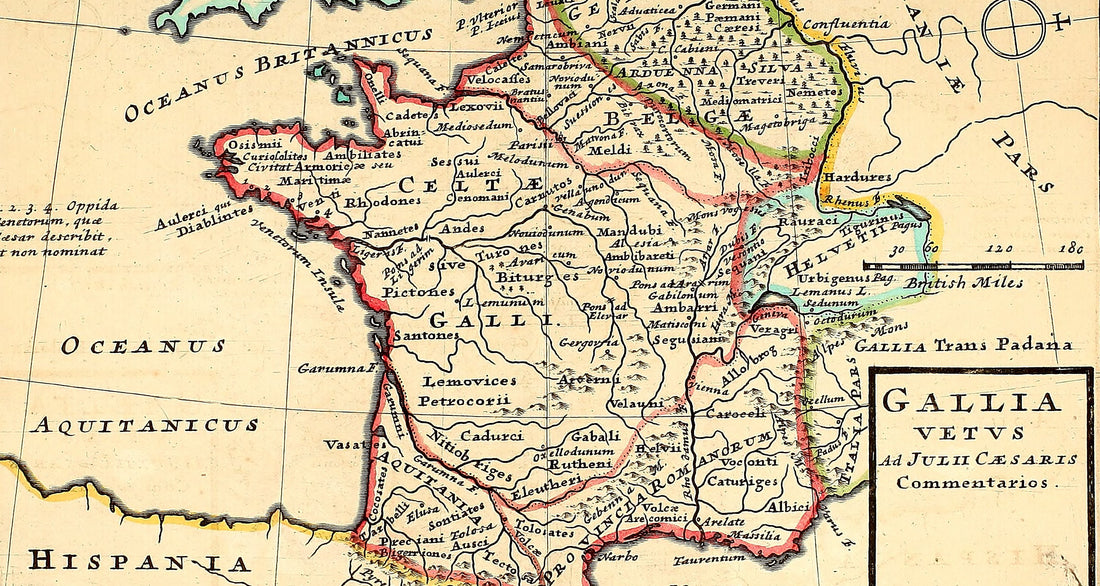
Julius Caesar's Gaul
Alice PettirossoShare
Gaul in the Time of Julius Caesar: Conquest and Birth of a New World
Gaul at the time of Julius Caesar represents one of the most intense moments in ancient history, a vast territory that covered much of today's France, Belgium, Luxembourg and Switzerland. Before the arrival of the Romans, Gaul was inhabited by Celtic tribes, each with its own cultural, linguistic and political identity. While northern Italy, Cisalpine Gaul , was already under Roman control, Transalpine Gaul was still a mosaic of independent peoples.
The Gallic War: Caesar and the Fate of Gaul
In 58 BC, Julius Caesar launched a series of military campaigns that would become legendary, known as the Gallic Wars . With a combination of military cunning, diplomacy, and savagery, Caesar managed to subjugate the many Gallic tribes, consolidating Rome's power over a vast and strategic territory. This war was the springboard for his domination of the Roman Republic.
The motives for conquest: power and security
The reasons for the invasion were multiple: Caesar , as proconsul of Cisalpine Gaul , sought to increase his political and personal prestige. But Gaul also represented a potential threat to Rome, with continuous migratory movements of Celtic and Germanic tribes, such as the Helvetii, who destabilized the borders of the Empire.
Divide and conquer: Caesar's winning strategy
Caesar skillfully exploited the internal divisions among the Gallic tribes, adopting the strategy of "divide and conquer" to obtain temporary alliances and weaken the common resistance. One of the decisive moments of the war was the siege of Alesia, in 52 BC, where Caesar defeated the leader of the Gallic rebels, Vercingetorix. With the capture of Vercingetorix, the organized resistance collapsed. The Gallic leader was imprisoned for years and finally executed during Caesar 's triumph in Rome.
Gergovia: the victory of Vercingetorix
Despite his skill, Caesar was not immune to defeat. The Battle of Gergovia was one of those rare moments in which Vercingetorix managed to defeat the Roman army. Skillfully defending the mountainous city, Vercingetorix inflicted heavy losses on the Romans, approximately 700 legionaries and 46 centurions fell. A victory that, although significant, was not enough to turn the tide of the war.
The Siege of Avaricum: A Demonstration of Strength and Brutality
An episode that highlights the ferocity of the Gallic Wars is the siege of Avaricum, a city belonging to the Bituriges tribe. After building an assault ramp, Caesar ordered the capture of the city and the massacre of all 40,000 inhabitants. The courage of the Gallic warriors, who tried until the last to destroy the Roman ramp, underlines the desperate resistance put up by the Celtic tribes. However, the episode also testifies to Caesar 's brutal determination to complete his conquest.
Alesia's Masterpiece: Roman Ingenuity
The Battle of Alesia was not only a confrontation of armies, but also a demonstration of Roman engineering superiority. To prevent the arrival of Gallic reinforcements, Caesar ordered the construction of a double line of fortifications: an internal one to trap Vercingetorix and his army inside the city, and an external one to defend against the assaults of the Gallic relief forces. This maneuver proved decisive and guaranteed Caesar the definitive victory.
After the war: the Romanization of Gaul
After the defeat, Gaul was incorporated as a province of the Roman Republic. However, the process of Romanization was complex and uneven. While some regions, such as Gallia Narbonensis, were already influenced by Roman culture, other parts of Gaul , such as Gallia Comata, took longer to assimilate Roman institutions and culture. The construction of cities, roads, and the spread of the Latin language and Roman laws radically transformed Gaul , integrating it more and more into the Roman world.
The "de bello Gallico": Caesar's narrative
Julius Caesar recounted his campaign in Gaul in "de bello Gallico", a work that aims to exalt his military exploits and justify his actions. However, in Caesar 's account, the brutal reality of the war, which cost the lives of hundreds of thousands of Gauls, is toned down, presented in a favorable light to the Roman general, who portrays himself as a wise and just leader.

